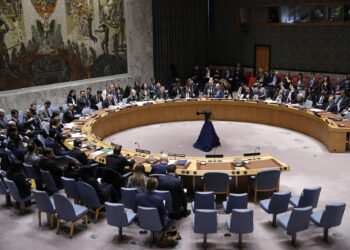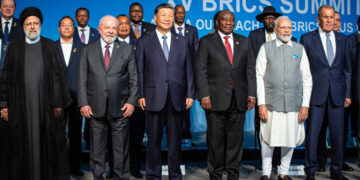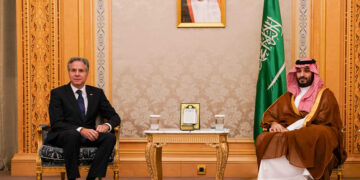The following report is a summary of the proceedings from an expert workshop on the proposed U.S.-Saudi security agreement, which was convened by DAWN and Georgetown University's Alwaleed Center for Muslim-Christian Understanding. The workshop analyzed how this secretive deal would transform the relationship between the United States and Saudi Arabia, and its many implications for the Middle East and U.S. foreign policy in the region. The proceedings at this workshop were conducted under the Chatham House Rule, meaning that participants were free to use the information received, but neither the identity nor the affiliation of the speakers, nor those of any other participant, could be revealed.
—This report was prepared by Lillian Avedian
The workshop provided a forum for academics and experts with deep knowledge of the Middle East to share their insights regarding the proposed U.S.-Saudi security agreement and debate its potential impacts across the region. Speakers discussed the components of the reported agreement under negotiation, including economic and military cooperation between the United States and Saudi Arabia, collaboration on civil nuclear energy and communications technologies, and a U.S.-Saudi defense pact. They highlighted the critical role of Gulf states in the emerging multipolar world order and attempts by the U.S. to curb the influence of rival powers through such agreements.
The panelists also discussed the prospects of diplomatic normalization between Saudi Arabia and Israel, which the U.S. has attempted to attach to the agreement, in a post-October 7 landscape. They reflected on the detrimental implications of a deal for the rights of Palestinians and for people across the Middle East and North Africa. Amid the relative decline of the U.S. on the global stage, speakers debated the likelihood that the U.S. Congress would approve an agreement with Saudi Arabia and the future of U.S. foreign policy in the Middle East.
Following opening remarks, the workshop consisted of three panels. Brief presentations by panelists were followed by a question-and-answer session and group discussion.
Panel 1: The U.S.-Saudi Security Agreement
The first panel addressed three fundamental questions: What do we know about this secretive deal? What would it do for Saudi Arabia? How would it transform the U.S.-Saudi relationship?
The first panelist argued that the potential U.S.-Saudi deal is, in part, a response to the disintegration of the security infrastructure set up in the Middle East by the U.S. since the end of the Gulf War in 1991. The panelist pointed to the U.S. withdrawal from Iraq under President Barack Obama and the halfhearted response under President Donald Trump to Iran's attack on Saudi oil facilities in 2019 as key turning points that indicated to Gulf states that they can no longer rely on the U.S. to provide security commitments. In response, Saudi Arabia and other Gulf states have turned to China and Russia, while cultivating self-reliance for their security. In a multipolar world order, Saudi Arabia believes that it can make itself relevant to both sides of the global divide, cooperating with China on AI development, big data analysis, and the procurement of missile security, drones and other capabilities. The U.S., on the other hand, is seeking to hold on to its role as a world leader and keep Saudi Arabia from pivoting to the East. In a deal with the U.S., Saudi Arabia wants a defense pact under which Washington would be bound to defend Saudi Arabia in case of an attack by a third country, assurances the U.S. is unwilling to provide.
The second panelist argued that the proposed agreement would contain sources of continuity as well as transformation in U.S.-Saudi relations. Economic and military collaboration between the U.S. and Saudi Arabia has been constant since the 1970s, and arms sales and collaborative investments on AI are likely to continue regardless of whether a deal is signed. While Washington has a long history of attempting to restrict the influence of its rivals in the Middle East, such as during the Soviet era, it is an open question today whether the U.S. can curb China and Russia's influence in the region, particularly in light of Saudi Arabia's ideological affinity to their regimes and its outsize economic ties with China. A U.S.-Saudi nuclear energy program has the potential to be the most momentous aspect of a treaty, the panelist argued. The U.S. has sought to avoid the development of nuclear energy in the Middle East due to concerns of a nuclear arms race and the potential for a nuclear war in a war-torn region. However, by assisting Saudi Arabia in developing nuclear energy while abandoning the Iran nuclear deal and escalating tensions in the region, the U.S. would be providing Saudi Arabia with the means and encouragement to develop nuclear weapons.
The third panelist argued that global transformations in technology, energy security and the economy are critical to understanding the proposal for a U.S.-Saudi agreement. With the advent of AI, 5G and new communications and energy technologies, Saudi Arabia continues to have a central role in global energy security while striving to be a major player in these emerging fields. The proposed security treaty is in part an attempt to align the U.S. and Saudi Arabia in the emerging geopolitical economy through cooperation on AI, energy and civil nuclear power. The U.S. recognizes that Saudi Arabia has critical influence in a pivotal region, especially in a "multinodal" world. The Russian invasion of Ukraine has also shifted the priorities of the U.S. toward preserving transatlantic ties and protecting Europe's energy security amid concerns about Russia as a competing energy power. The U.S. hopes that Saudi Arabia's interests will naturally align with its own with further collaboration, more so than with China or Russia.
While the U.S. has attempted to attach a Saudi-Israel normalization deal to its proposed security agreement with Riyadh, participants were largely unanimous that this normalization will not take place. One participant argued that while Crown Prince Mohammed bin Salman and his inner circle are invested primarily in Saudi national interests above Palestinian or Arab interests, they cannot normalize relations with Israel due to the Saudi public's strong support of Palestinian rights. Another added that Saudi-Israeli normalization is unlikely unless something drastic happens, such as if Saudi leadership determines that the threat from Iran outweighs any risk that would come with openly abandoning the Palestinians. Several of the speakers agreed that Israel's war on Gaza has fundamentally transformed the Arab world's perception of Israel and its leaders. One argued that as Israel looks increasingly weak in its failure to defeat Hamas and Hezbollah, the myth of Israel as omnipotent and impenetrable has been debunked. It is now apparent that Israel is bad for regional stability, they added, and Netanyahu's government is not a rational and predictable partner for business and cooperation. One participant stated that even if a U.S.-Saudi security agreement that includes Saudi-Israeli normalization is not signed, many of the components of the reported "megadeal" would likely be formalized in a piecemeal way, based on shared U.S.-Saudi interests, including collaboration on technology and civil nuclear energy.
The participants engaged in a lively debate regarding whether or not the U.S. Congress would approve a U.S.-Saudi defense treaty. One participant argued that members of Congress across the aisle recognize Saudi Arabia as a critical regional power and would approve a treaty in order to keep oil prices down, continue weapons sales and prevent China from helping Saudi Arabia develop nuclear weapons. It is also possible that an American president would sign an agreement without Congressional approval. In response, several of the participants argued that a treaty would not make it through Congress, as Saudi Arabia is highly unpopular and is not seen as a viable partner among members of Congress. One speaker added that the unpopularity of Saudi Arabia is a rare area of bipartisan consensus among members of Congress and the American public. Several of the participants also agreed that considering that U.S. foreign policy has the potential to change every four years with each presidential election, it is an open question for Saudi Arabia whether an agreement would survive changes in the White House.
Many of the participants were also in agreement that regardless of the wishes of the U.S., Saudi Arabia will not halt its deepening relations with China and Russia, although they differed on to what extent Saudi Arabia's "pivot toward the East" has already taken place. One stated that Saudi-Chinese cooperation in technology, de-dollarization, energy and other fields will continue irrespective of a deal with the U.S. Another participant countered that while Saudi Arabia has increasingly turned to China and Russia for trade and equipment transfers, pivoting away from the West on military matters would require Saudi Arabia to develop an entirely new security infrastructure, which would take several decades. One participant added that U.S.-Saudi relations have returned to their status prior to the 2018 assassination of Jamal Khashoggi by the Saudi government.
Panel 2: The Regional Political Context
The second panel addressed the following questions: What are the deal's implications for the MENA region? What would it mean for potential Saudi normalization with Israel? Where would it leave the Palestinians?
The first panelist argued that U.S. policies toward Saudi Arabia are deeply mistaken and based on flawed and dated perceptions of the Middle East among the American public. They argued that the U.S. should not be willing to offer Riyadh so many concessions in order to compel the Saudi regime to sign the proposed security agreement. Primarily, much of the American public believes that the U.S. needs to protect Israel from a hostile regional environment. While Saudi-Israeli relations have not been formally normalized, in reality the countries share a quiet, tacit relationship and already cooperate economically. Moreover, while the American public holds an outdated assumption that the U.S. depends on Saudi oil, the U.S. has been the largest producer of crude oil in the world since 2018. While the U.S. seeks to maintain its primacy in the Middle East, Saudi Arabia and other countries are already benefiting from a multipolar world order and are unlikely to reverse course.
The second panelist agreed that the potential U.S.-Saudi agreement will neither benefit the U.S. nor the people of Saudi Arabia. Further military assurances from the U.S., which has long been Saudi Arabia's biggest military supplier, would entrench Mohammed bin Salman's brutal dictatorship and endorse his anti-democratic and repressive domestic and foreign policies at the expense of the aspirations of the Arab people for a better future. The U.S. cannot guarantee that a Saudi civilian nuclear program will not be used by Mohammed bin Salman to develop nuclear weapons, catalyzing an arms race with Iran. The U.S. has supplied Saudi Arabia with more than $140 billion worth of arms sales over the decades, including $4.22 billion authorized between September 2021 and September 2022, $500 million in September 2023, and $582 million proposed in December 2023 by the Biden administration—all in violation of the Arms Export Control Act and Foreign Assistance Act, which restrict U.S. arms sales to foreign governments implicated in human rights violations. Rather than reverse the multipolar world order, the proposed U.S.-Saudi security agreement would embolden Saudi Arabia and other countries to play off the U.S., China and Russia to extract maximum benefits from them all.
The third panelist argued that the deepening alignment between the U.S. and Saudi Arabia since the Obama administration has already had a refracted impact across the Middle East. The panelist was cautious about overreading the transition to a multipolar moment, as Saudi Arabia and other countries still center American primacy while calculating their security interests, even as they diversify their weapons suppliers. However, the U.S., despite its longstanding primacy in the Middle East, has behaved much more as a regional co-belligerent than a balancing major superpower, beginning with President Obama's entry into the Saudi-led war in Yemen. The U.S.-Saudi alliance has had several consequences on the Middle East, one being the relegation of Palestine to a geopolitical non-issue. This is evident in Israel's possible genocide in Gaza, which is ongoing without any genuine objections from Arab countries. Another consequence of U.S. policy toward Saudi Arabia is the emboldening of authoritarianism, creating a moral hazard that encourages reckless behavior by Israel, Saudi Arabia, the United Arab Emirates and others.
The panelists engaged in a wide-ranging conversation about how Israel's war in Gaza and Lebanon impacts the possibilities of a U.S.-Saudi deal.
Several of the participants presented language from Saudi leadership that demonstrates that it prioritizes the country's security needs above the interests of the Palestinian people. One referred to Mohammed bin Salman's repeated call for "irreversible steps" toward a Palestinian state, noting that this is an immense downgrade from official recognition of a Palestinian state. Another argued that, in pursuit of a security deal with the U.S., the Saudi regime has been engaging in tactical propaganda to manage domestic public opinion about Israel, presenting the conflict as a fight with Hamas and Hezbollah rather than a fight against the Palestinian and Lebanese people. While the participants all agreed that public opinion in Saudi Arabia is pro-Palestinian, they debated whether that matters for a deal with the U.S. One speaker illustrated examples of this support, including the success of active boycott campaigns in some Gulf countries targeting major American companies including Starbucks and McDonald's. However, they argued that the Saudi regime would not reject a deal with the U.S. that met Saudi interests, including concrete security commitments and cooperation on civilian nuclear capabilities, regardless of public opinion.
The participants also debated the impact of regional developments on the security infrastructure in the Middle East. One speaker disagreed with the point that Israel's failure to defeat Hamas and Hezbollah has damaged its reputation in the region, arguing that Saudi Arabia is admiring and learning from Israel's approach to the war in Gaza. They argued that the war will lead to more weapons sales in the Middle East and deeper military cooperation between the U.S. and Israel as partner suppliers of a diverse apparatus of new weapons and surveillance technology. The participants also debated whether a U.S.-Saudi security deal would open the door to similar agreements with Israel and the UAE. One argued that this is unlikely, as the U.S. body politic is not interested in another round of forever wars and deep entanglements with reckless actors abroad.
One speaker stated that while the Saudi leadership has set a low bar regarding what it expects of Israel in its treatment of the Palestinians, the Israeli government cannot even clear that bar. They also argued that a U.S.-Saudi deal would not be approved by Congress under a second Trump administration, as Senate Democrats would not vote for it. Rather, the Saudi leadership, in response to rhetoric from the U.S. about the critical role of Saudi Arabia in emerging great-power competition, would expect a Harris administration to prove that it values their relationship and does not just see the country as bait for Israel. While a U.S.-Saudi agreement that includes Saudi normalization with Israel is unlikely, pieces of the proposed deal could still be actualized during the next administration in Washington.
Ultimately, the participants largely agreed that the consolidation of U.S.-Saudi relations has been detrimental for the interests of the Palestinian people. One argued that the U.S. has been unwilling to adapt its foreign policy in the Middle East to changing circumstances in the region, namely the genocide in Gaza that may also now unfold in Lebanon. Rather, the U.S. has been doubling down on its support for dictators and desire to consolidate an anti-Iran bloc, while hoping that a deal with Saudi Arabia will solve or sideline the Palestinian issue. Another participant added that the greatest impact of the war on Gaza is its normalization of an immense level of death and destruction in Palestine, diminishing the prospect of other Arab countries establishing formal ties with Israel.
Panel 3: Implications for U.S. Foreign Policy
The third panel addressed a final question: What does this deal mean for the U.S. in the Middle East, including ties with Saudi Arabia, U.S. hegemony in the region and its rivalry with China?
The first panelist noted that, while the U.S. and Israel are democracies in theory, very little consideration has been given to public sentiment and consultation in crafting the proposed U.S.-Saudi agreement. This is a hallmark of U.S. policy and engagement in the Middle East, as well as governments' own policies within the region, in which the voices and desires of the people do not matter in decision-making. An additional concern about the agreement and its dependence on Saudi-Israeli normalization is that it could strengthen the perception that Israeli interests drive U.S. foreign policy. The panelist referred to the role of AIPAC in driving progressive candidates critical of Israel out of U.S. elections. In the long run, this would hurt the U.S., given that American public opinion is increasingly critical of Israel's war in Gaza. It may also inspire other interest groups to copy AIPAC's tactics, contributing to the degradation of American democracy. A third concern about the deal is that it could heighten perceptions of U.S. insincerity in promoting democracy and human rights abroad, particularly in countries like Egypt, Jordan and Morocco whose people are critical of the U.S. and Israel yet whose governments have friendly relations with Washington. The panelist described global support for Palestinian rights as the last anti-colonial struggle against a white, European settler-colonial movement remaining as a holdover from the 19th century.
The second panelist argued that American foreign policy has come to be shaped by the perception that the U.S. is in strategic competition with China. The U.S. is concerned about growing ties between China and the Gulf, including reports about ballistic missile technology transfers to Saudi Arabia and an expanding Chinese presence in the UAE. Despite China's growing influence, the U.S. privately delivers the message to Gulf leaders that it is the only country that would militarily defend its partners in the region. This message resonates in the Gulf, as the U.S. is the world's only expeditionary fighting force willing to defend its partners against those they see as malign actors. Saudi Arabia has insisted on a U.S. defense treaty ratified by the Senate to ensure its continuity across American elections and administrations in Washington. Prior to October 7, there were enough votes in Congress to approve a U.S.-Saudi treaty, which would still likely be the case under a Harris administration. Regardless of whether an agreement is reached, Saudi Arabia will continue to modernize its economy and seek civil nuclear energy from other countries. For the U.S., the question is whether it would be better for oversight and nonproliferation to provide these energy sources itself. Failing to secure an agreement quickly, however, may be perceived as a sign of U.S. decline and a win for China. In the years to come, strategic competition and relative U.S. decline, which the panelist argued are two sides of the same coin, will continue to play out on the global stage.
The participants engaged in a discussion about the diminishing role of the U.S. globally. One posed the question of whether the U.S. can offer the Middle East a more competitive American model relative to China, Russia and other countries, rather than solely rely on its military force and mercenary protection to secure economic concessions. One speaker described the U.S. as a late-stage empire, noting the declining fear of imperial powers among peoples across the Middle East and interrogating whether the U.S. is attempting to hold on to its hegemony. Another added that the U.S. can offer its influential cultural currency, its prestigious academic institutions and—until this year amid its strong support for Israel and regional autocracies—its values.






































